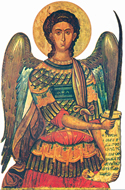 Loading... Please wait...
Loading... Please wait...Search our Talks
MP3 Downloads
Update on New Talks
Prayer Requests
Forty-day Commemorations
Commemorations of the Living and the Departed
at 40 Consecutive Divine Liturgies
Commemorating our living and departed loved ones at the Divine Liturgy is one of the most powerful forms of prayer, and it is the best thing that we can do to help them.
Lists of commemorations may be submitted to be read at the Proskomedia (the first part of the Liturgy), at which particles are taken from prosphora for each of the names listed. Later, these particles are put into the Chalice containing the Blood of Christ, during which a prayer is read for the forgiveness of the sins of those commemorated.
In times of particular need, especially when someone has just reposed, there is a pious tradition of submitting names to be commemorated at the Divine Liturgy for 40 days in a row. Since the Liturgy is not served daily in most parishes, monasteries are one of the few places where these forty-day commemorations can be requested.
Frequently Asked Questions
Why is it necessary to commemorate the dead?
Quite simply, because the dead need our prayers as much and more than the living. St. John of Shanghai says that “each word of prayer for the reposed is like a drop of water to a thirsty man.” Though their bodies are dead, the departed can sense these prayers, and by this means we keep company and show our love for them. The Church has known many instances of people who while living failed to “bring forth fruit worthy of repentance,” but who have obtained blessed repose through prayers for them after their departure.
For more information read the following pamphlet, containing excerpts from the writings of St. John of Shanghai, St. Mark of Ephesus, St. Nicodemus of the Holy Mountain, and others: The Dead Are in Great Need of Our Help
Is it necessary to give a donation when requesting commemorations?
Though not a requirement, it is a pious custom in the Orthodox Church to make a donation when requesting commemorations at the Divine Liturgy. Many monasteries such as our own are supported exclusively by donations, and so it is helpful to support them financially to the best of one’s ability when requesting prayers. In addition, it is well known that donations made to monasteries, churches, and the needy in memory of the departed are of great benefit to their souls.
Saint John the Wonderworker of San Francisco writes,
"Therefore, panikhidas [memorial services for the dead] and prayer at home for the dead are beneficial for them, as are good deeds done in their memory, such as alms or contributions to the Church. But especially beneficial for them is commemoration at the Divine Liturgy.
… Use your money not for outward adornment of the coffin and grave, but in order to help those in need, in memory of your close ones who have died, [and] for the churches where prayers for them are offered."
Before submitting names for commemoration, and in order to avoid any delay, please read the guidelines below.
Guideline for Submitting Names for Commemoration of the Living or Departed:
For Orthodox Christians
* Specify whether the name(s) submitted are of people living or departed.
* Submit baptismal names only—do not include last names/surnames.
* Please do not use nicknames. For example, write Alexander rather than Alex, Katherine rather than Kathy, Nicholas rather than Nick.
* Do not use double names such Anna Maria or John Michael - refer to the following link.
* Specify the titles of clergy and monastics. Do not use ambiguous titles such as “Father,” “Mother,” etc.
- For hierarchs use Patriarch, Metropolitan, Archbishop or Bishop.
- For clergy and monks use Archimandrite, Abbot, Archpriest, Hieromonk, Priest, Archdeacon, Protodeacon, Hierodeacon, Deacon, Schema Monk, Rassaphore Monk, Novice, Subdeacon or Reader.
- For nuns use Abbess, Schema Nun, Rassaphore Nun or Novice.
For Non-Orthodox
Please note that non-Orthodox names are not commemorated during the Divine Liturgy or other services. Non-Orthodox Christians are commemorated during the private prayers of the monastery. Always specify when submitting the names of non-Orthodox.




